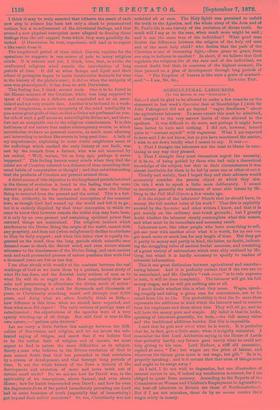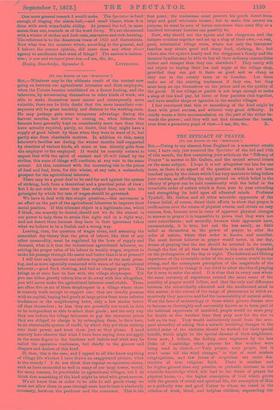AGRICULTURAL LABOURERS.
rr0 THE MHTOE OF THE "SPBOTATOR:l SIR, —I shall be glad to be allowed to make a few remarks on the statement in last week's Spectator that at Stourbridge I (with Sir- John Pakington) did not go beyond "vague kindliness" about the agricultural labourer. To some extent this must be admitted,. and charged to the very narrow limits of time allowed to the- speakers. It was difficult to do more, and perhaps it might have been better to have said nothing. I did not, however, intend quite to "content myself" with vagueness. What I am reported to have said I do not know, but as you have mentioned the matter,. I wish to set down briefly what I meant to say. It was :—
1. That I thought the labourers not the least to blame in com- bining in any way they pleased.
2. That I thought they must themselves regret the necesaity„ if it be so, of being guided by those who had only a theoretical' knowledge of the subject, but that in their circumstances it was. almost inevitable for them to be led by some one or other ab extra..
Thirdly and mainly, that I hoped they and their advisers would accurately consider the precise object at which they aim.. Onthis I wish to speak a little more deliberately. I meant to inculcate generally the substance of some able letters by Mr.. Gregin the Pall Mall Gazette a few weeks ago.
Is it the object of the labourers' friends that he should have, in. money, the full market value of his work? That this is explicitly avowed by the Spectator and other writers I know, and that it is- put mainly on the ordinary anti-truck grounds ; but I greatly doubt whether the labourer clearly contemplate what this means, and what must be its immediate and necessary result.
Labourers now, like other people who have something to sell, get one year with another about what it is worth, for no one can get much more or much less for any length of time. But they get, it partly in money and partly in kind, the latter, no doubt, indicat-- ing the straggling relics of ancient feudal manners, and consisting- of a great variety of subventions which were ably outlined by Mr.. Greg, but which it is hardly necessary to specify to readers of tolerable information.
This is one great distinction between agricultural and manufac- turing labour. And it is perfectly certain that if the two are to be assimilated, and Mr. Carlyle's "cash-nexus" is to rule supreme in both, it will be done completely. The labourer will get his full money-wages, and he will get nothing else at all.
I much doubt whether this is what they mean. Wages, speak- ing roughly and taking a given sum for convenience, are to be- raised from 12s. to 15s. The probability is that the 3s. more than represents the additions in kind which the labourer used to receive- from his employers and those above him. They will all go, and he will have the money pure and simple. My belief is that he looks, speaking of labourers generally, for both,—the full money value- and the traditional additions besides. But this is impossible.
I said that he gets now about what he is worth. It is probable- that he, in fact, gets a little more, when it is rigidly estimated. I remember the first Lord Ashburton saying in the House of Lords- that probably hardly any farmer gave barely what he could not. help giving to his men. Lord Radnor, a stiff old economist,. replied at once, " Yea ; but wages are the price of labour, and whatever the farmer gives more is not wage, but gift." So it is properly speaking ; and is it certain that that state of things must and ought to be swept away ?
As I said, I do not wish to dogmatise, but one illustration of interest occurs to me, if indeed my recollection is correct, for I am obliged to quote from memory. According to the Reports of the Commission on Women and Children's Employment in Agriculture, the best-off labourers in Britain are those of Northumberland. But if I am not mistaken, these do by no means receive their wages solely in money. One more general remark I would make. The Spectator is fond enough of ringing the alarm-bell,—and small blame, when it is done with such remarkable ability. At present the bell, in more senses than one, reminds us of the word Swing. We are threatened with a winter of strikes and lock-outs, starvation and rick-burning. The reference is to the disastrous times of 1830 and thereabouts. Now what was the measure which, according to the general, and I believe the correct opinion, did more than any other direct agency to ameliorate that state of things ? The answer is instruc- tive; a new and stringent poor-law.—I am, Sir, &c.,
liagley, Stourbridge, September 3. LYTTELTON.



































 Previous page
Previous page